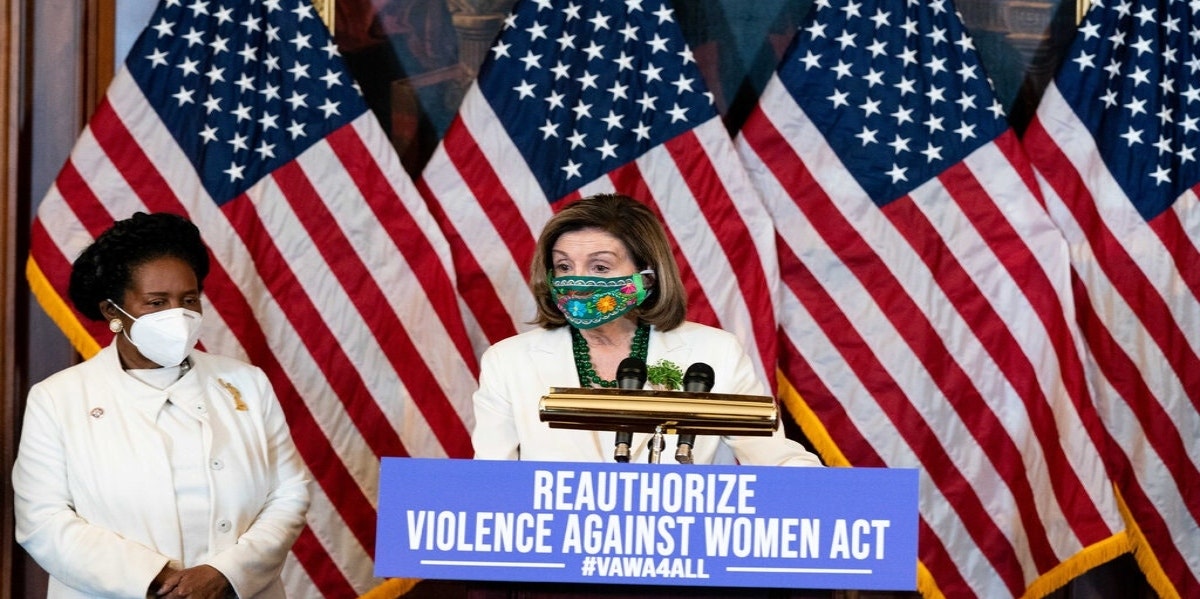Preventing Violence Against Women Isn’t Political, So Why Are Republicans Opposing The VAW Act?
Politics have no place in domestic violence.
 YouTube
YouTube There are some bipartisan issues that transcend political values and unite opposing parties and preventing violence against women is one of them — or at least it should be.
After March 16th's shocking gun attack in Atlanta left seven women dead, it doesn’t seem absurd to assume all political parties could be in agreement that more needs to be done to protect women from gun violence.
However, as the House Of Representatives voted to reauthorize the Violence Against Women Act (VAWA), a shocking number of Republicans opposed the passage, raising questions about how the party views women.
The VAWA is a landmark law that has helped combat violence, sexual assault, and stalking.
The act was first enshrined in law in 1994, written by President Joe Biden while he was still a senator. It was the beginning of monumental progress in acknowledging how violence against women permeates through households, workplaces, and relationships.
The act also enabled key funding for violence and sexual abuse prevention and resources for victims.
It began with the goal of ending gender-based hate crimes perpetrated by men against women, but later expansions of the act allowed for the inclusion of same-sex couples and other minority groups.
The act simultaneously addresses how women experience violence differently while still accounting for the needs of other genders.
The law had elapsed in 2019 during Trump’s term but with domestic violence rapidly increasing in the wake of COVID-19, President Biden made renewing the act a top priority as part of his efforts to end domestic violence.
It appeared to be one of Biden’s least contentious goals for his presidency. Domestic violence doesn’t discriminate based on political allegiances.
Yet with 172 Republicans opposed the reauthorization of the act, it is clear that there is an ever-decreasing amount of issues that partisan politics can unite on.
Republicans opposed new firearm restrictions that protect women from the “boyfriend loophole.”
One of the main issues many Republicans were vocally against was the new provisions to the act that covered up key loopholes that had previously left women vulnerable to gun violence. The act originally banned spouses convicted of domestic violence from owning firearms but placed no similar restrictions on ex-partners or non-married partners.
For Republicans, the act was an attempt to advance a gun control agenda—but for domestic violence victims, this new restriction could be life-saving.
Women who are killed by their abusers are more likely to be murdered with a firearm than by all other means combined. The risk of homicide for women is also increased by up to 500% if a gun is present in situations of domestic violence.
Victims are also much more likely to be murdered by their abusers after ending the relationship. By applying the act to ex-partners, it accounts for the disturbing nuances in how abusers prey on victims even after the relationship has ended.
Gender politics have also been dragged into the mix, further distracting from the merits of the VAWA.
At its core, the act aims to reduce hate crimes. Though it historically focused on hate crimes against women, new provisions strived to meet the needs of a changing nation.
The act provided new protections for gay, bisexual, and transgender people and gave Native American tribal courts the power to prosecute non-natives for sex trafficking, sexual violence, and stalking, a direct response to the high rates of violence against indigenous women.
Of course, Republicans looked past all these attempts to address the disproportionately high figures of violence against the LGBTQ community and instead labeled the act as some kind of disguised attempt to push the much-feared “far-left political agenda”.
Republican Representative Debbie Lesko told the House, “The most egregious provisions of this bill push leftist gender ideology at the expense of important protections for women’s privacy and safety.”
She took issue with the possibility that shelters would now be taking in more than one gender, leaving women vulnerable. What she didn’t appear to acknowledge was that shelters for men and transgender people do exist and would now have the opportunity to access crucial funding.
President Biden previously labeled the act his “proudest legislative achievement” but how violence is perpetrated against minority groups has changed since the '90s making it crucial that this watershed act adapts to new circumstances.
Preventing the escalation of domestic violence situations by removing guns and extending the act to protect more than just women is not an issue of left versus right but, instead, one of life versus death.
If you’re experiencing domestic abuse, you’re not alone.
For anyone struggling with domestic abuse, call the National Domestic Violence Hotline at 1-800-799-SAFE (7233). If you’re unable to speak safely, text LOVEIS to 1-866-331-9474 or visit thehotline.org.
Alice Kelly is a writer living in Brooklyn, New York. Catch her covering all things social justice, news, and entertainment.

